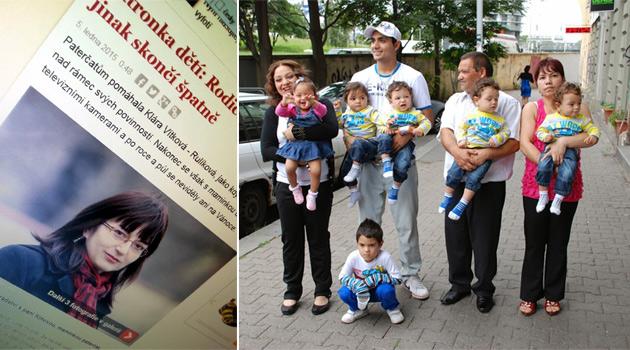Czech publicity about family of Romani quintuplets crosses the line

Klára Vítková-Rulíková has become a celebrity. She became one by supporting the first quintuplets ever born in the Czech Republic and their family.
As a celebrity, she has exclusive access to the media, where she comments and comments and will probably continue to comment long into the future. Many of the interviews with her about the quintuplets have almost crossed the line and bordered on indecent and unprofessional.
All of this has occurred around the recent Czech Television documentary about the quintuplets’ family. In her most recent interview for the online magazine OnaDnes ("Her Today"), however, Vítková-Rulíková has crossed all professional lines associated with her position at the Association of Twins and Higher Multiples and her position at the Czech Ministry of Labor and Social Affairs.
As a patron of the family, she is now behaving like a repudiated friend. She says, of course, that all she wants to do is help.
In some passages of her recent interview, however, she goes so far as to consider herself the state. When asked by OnaDnes: "The children belong to them, so why can’t they raise them as they see fit, without following your rules?", she responds: "They can, but then they can’t ask for state aid."
Textbook example of how not to do social work
The main problem is that Vítková-Rulíková has failed as a professional, in a completely textbook way. Organizations providing social services, even those providing specialized counseling that is not registered as a social service, all have quality standards for the services they provide.
Those standards include confidentiality. Private matters from cases are not shared with one’s own friends, to say nothing of sharing them with the entire country through the media.
Irrespective of what Vítková-Rulíková has actually said, her very appearance in this magazine, which has an impact nationwide, is a problem. Private matters should only be discussed by people working on a particular case.
Any information that must be released to the outside world should only be released without making it possible to identify those at issue. The entire point of social work seems to be alien to Vítková-Rulíková.
Social work is not aid, it is about support, about finding ways to best address a particular situation. Support includes respect for autonomous decision-making and different lifestyles even when a "social worker" has the feeling that poor decisions are being made.
Those who receive social services are responsible for themselves. The social worker is not there to make decisions for them.
If a social worker has the feeling that the collaboration is not leading anywhere, then he or she can end it and work with someone else. However, this should be done without announcing it.
The mistake in this entire scandal happened right at the beginning: Friendship is friendship, and professional social work is social work, with all of the requisite obligations and rules regarding those to whom it is provided. If a relationship is considered a friendship, then someone else should be engaged to do this professional work, someone less biased, someone with no risk of experiencing an emotional schism.
However, it would be wrong to say that the mistake here was solely committed by the person who said what she said to the online magazine OnaDnes. The greater error concerns the current concept of social policy and social work in the Czech Republic.
Very often it seems that the aim of Czech social work is not to resolve situations and support clients, but to punish them for the situations in which households or individuals find themselves. Problems of discrimination and poverty are primarily perceived as individual failures, not as part of a broader reality.
In this regard the quintuplet’s patron is just part of the mainstream. In one part of the interview, she says the local authority knew very well what it was doing when it decided not to provide more support to the family ("Today I know that they knew who that family were. I didn’t know.").
Both the local authority and Vítková-Rulíková have missed the point: Support was mainly being provided to the children, and children are entitled to support irrespective of who their parents are. In the case of the quintuplets, moreover, the family is not showing any signs of failure (such as committing violence against the children, for example).
Threats to take children away are just… threats
One of the most scandalous parts of the interview concerns removing the children from the family. The quintuplets’ patron fears this will happen.
She says their own mother warned her of the issue and she is bothered by the fact that she is being criticized for raising it. However, just like their mother, Alexandra Kiňová, I am of the opinion that what was said constituted a threat.
As an employee of the Czech Labor and Social Affairs Ministry, Vítková-Rulíková should know that children are not supposed to be removed from their families merely for social reasons. The Supreme Court has upheld that.
That is precisely why there are various support services here, and that is also why the Association of Twins and Higher Multiples requests various grants to provide services. If someone attempts to exact conformity to rules by arguing that failure to conform could result in children being removed, that is a threat.
Is anyone mistreating the quintuplets or their brother, are their parents abusing them? No.
All of the children are thriving and seem satisfied. Do their parents sometimes fall down on the job?
Let’s admit that all of us who have children sometimes fail. What percentage of the Czech population "reheats" their bread rolls, how many of us sometimes feed the kids leftovers from the day before?
As for making useless expenditures, all we have to do is look at the statistics on Czech consumer loans. Let’s at least be honest with ourselves.